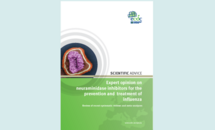Expert opinion on neuraminidase inhibitors for the prevention and treatment of influenza - review of recent systematic reviews and meta-analyses
This ECDC expert opinion confirms earlier assessments by ECDC and national authorities that there is no significant new evidence to support any changes to the approved indications and recommended use of neuraminidase inhibitors (NAIs) in EU/EEA Member States. Recommendations to treat patients with severe influenza – or those at high risk of the complications of influenza – and provide prophylaxis to the most vulnerable and their families are based on the evidence from randomised controlled trials, evidence from observational studies, extrapolation from studies, and a generally benign safety profile of these medicines.
With respect to stockpiling of neuraminidase inhibitors, evidence reviewed by the expert group supports the practice of stockpiling NAIs as part of national preparedness plans.
Executive summary
The neuraminidase inhibitors oseltamivir and zanamivir, currently authorised in the European Union/European Economic Area for treatment and prophylaxis of influenza disease (including seasonal, pandemic and zoonotic influenza), have been the subject of debate concerning their effectiveness and safety, and as a consequence, also the appropriateness of stockpiling these drugs for use in future influenza pandemics.
Three large systematic reviews and meta-analyses assessing efficacy, effectiveness and safety of two licensed neuraminidase inhibitors, oral oseltamivir and inhaled zanamivir, were reviewed: The 2014 Cochrane Collaboration report (Jefferson et al.), the 2015 MUGAS study (Dobson et al.) and the 2014 PRIDE study (Muthuri et al.). Additional reviews and studies were considered where appropriate.
The reviews by Jefferson et al. and Dobson et al. conclude that, for adults, oseltamivir decreases the time to first alleviation of symptoms of influenza-like illness (ILI) by 16.8 hours (95% CI 8.4–25.1) and 17.8 hours (95% CI 27.1 to 9.3), respectively. The time to alleviation of all symptoms among the sub-population with laboratory confirmed influenza infection was decreased by 25.2 hours 95% CI 16.0–36.2 in the Dobson et al. analysis.
Additional analyses within the Jefferson et al. and Dobson et al. reviews documented a statistically significant reduction in patient-reported pneumonia, a reduction in lower respiratory tract infections and a decrease in hospital admissions following influenza diagnosis among oseltamivir-treated groups.
All three reviews point to the importance of initiating treatment early, ideally within 48 hours (within 36 hours in the case of zanamivir in children) of onset of symptoms.
With regard to prophylaxis, the review by Jefferson et al. assessing pre- or post-exposure prophylactic oseltamivir observed a 3.05% reduction in absolute risk for laboratory-confirmed influenza A among groups receiving oseltamivir in four RCTs (RR 0.45; 95% CI 0.30–0.67). The trials were conducted in ambulatory community members and nursing home residents. Similarly, Okoli et al. reported an association in an RCT between reduction in laboratory-confirmed influenza A(H1N1) infection and prophylactic treatment with oseltamivir (OR 0.11; 95% CI 0.06–0.20), and in four observational studies of zanamivir (0.23; 95% CI 0.16–0.35).
The most commonly reported adverse effect was an increased risk of nausea and vomiting; Jefferson et al. reported the risk in adults receiving oseltamivir for vomiting (RR 2.43; CI 95% 1.75–3.38) and children (1.70; 95% CI 1.23–2.35), and Dobson et al. in adults (RR 2.43; 95% CI 1.83–3.23).
Limitations were identified for all three systematic reviews and meta-analyses.
While the reviews considered for this expert opinion add to the evidence on the beneficial and adverse impacts of neuraminidase inhibitors, it is clear that further studies are needed to strengthen the evidence base overall.
This ECDC expert opinion confirms earlier assessments by ECDC and national authorities that there is no significant new evidence from RCTs to support any changes to the approved indications and recommended use of neuraminidase inhibitors in EU/EEA Member States.
Available evidence provides support for the use of NAIs as prophylaxis and treatment and thus they can be considered a reasonable public health measure during seasonal influenza outbreaks, pandemics and zoonotic outbreaks caused by susceptible influenza virus strains.
Download
Read more on the ECDC website
News
Expert panel reviews neuraminidase inhibitors for the prevention and treatment of influenza
An ECDC expert opinion concludes that there is clear evidence supporting the use of neuraminidase inhibitors in the treatment and prevention of influenza. Moreover, the current recommendations in European countries on the use of the neuraminidase inhibitors oseltamivir and zanamivir are appropriate and should be applied by prescribing physicians.
Scientific and technical publications
Expert Opinion on neuraminidase inhibitors for prevention and treatment of influenza (Feb 2016)
A consultation with European and international public health experts was convened to review data presented in newly conducted systematic reviews and meta-analyses regarding influenza antivirals, in order to develop an ECDC Expert Opinion.
Publication data
Data
Table of contributions for the expert opinion on neuraminidase inhibitors for the prevention and treatment of influenza
The 'Table of contributions' contains all comments received through a public consultation on this topic and lists ECDC’s responses to those comments.







